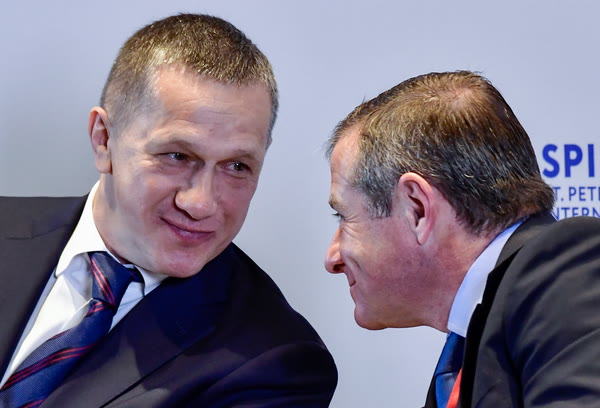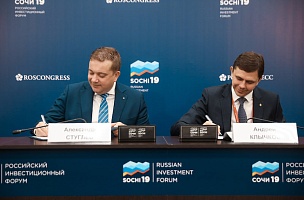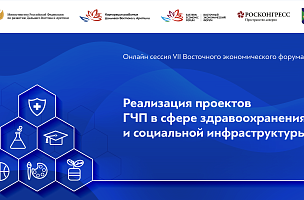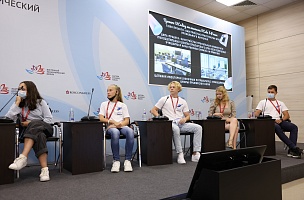KEY CONCLUSIONS
Investors show a growing interest for Russia’s Far East
«Total investment is 3.4 trillion roubles. This is the money to be invested in Russia’s Far East within next years,» Yury Trutnev, Deputy Prime Minister and Presidential Plenipotentiary Envoy to the Far Eastern Federal District of the Russian Federation.
The state has created functioning instruments to attract investment in the region
«In terms of taxes I believe everyone would agree that in the past few years the Ministry of Finance and the Ministry for the Development of the Russian Far East worked together relentlessly that resulted in sustained supporting elements that have been passed on to the regions,» Pavel Grachev, Chief Executive Officer, Polyus.
«We’re talking about a fairly unique situation where a single region, a depressive one just few years ago was makes its first steps towards becoming a breakthrough territory, as Mr. Trutnev humbly puts it <...> Being politically centralized, the region was decentralized economically <...> It’s a case of us being right in the middle of the global decentralizing trend,» Grigory Berezkin, Chairman of the Board of Directors, ESN Group
«TADs are a very attractive instrument. We’ve never seen anything quite as successful anywhere, not even in the EU,» Sergey Kolesnikov, President, TechnoNICOL Corporation
«We witnessed a evolution of this legislature, namely the extension of its lifecycle as initially the TAD law presumed it would be in operation for 3 years. Taxation code amendments have been adopted in 2017 that extended this legislature to 9 years. Thus, it’s a long-term benefit for the investors working on large scale projects with CAPEX over RUB 100 billion <...> Aside, I’d like to announce that tomorrow we’re planning to sign a basic agreement with Gazprom for the span of a few decades that would cement the intentions we spoke about at various stages of 2017,» Mikhail Karisalov, Chairman of the Management Board, SIBUR
«I believe we have ideal conditions for agriculture in Russia <...> We doubled our output, resolved the issue of produce security and now we’re looking at exporting our products,» Vadim Moshkovich, Chairman of the Board of Directors, Rusagro
PROBLEMS
Professional training issues
«There’s a certain dissonance we got. People study to be one thing, while another thing is in demand. In the next two months we’ll prepare a balance sheet, then we’ll start reforming the education system <...> We’ll start building the social infrastructure: schools, hospitals, kindergartens and we’ll focus on the centres where most of development is happening,» Yuri Trutnev.
Imperfections in Industry Regulation
«Today we’re confident that overall changes to legislature and general preferences aren’t enough. We need to address particular industries and in most of them we have major obstacles for investments. Later this year we’re going to proceed with reforming industrial legislature,» Yuri Trutnev.
«Without a doubt it’s the cost of financing that makes us less competitive worldwide today. It’s much cheaper everywhere else. Take the United States: 50% of all investments last year went into gas processing,» Grigory Berezkin.
Concession extensions to attract investors
«Last year a very important concession was provided: discounted electricity rates in the Far East <...> Yet the goal that has been set, namely to attract new investors in my opinion hasn’t been reached,» Pavel Grachev.
Lack of solution to the product biosecurity issue
«Korea, Japan, the entire South-East Asia they’re just product markets. What is the main problem when we talk about our product? It’s biosecurity. These issues are not resolved here. Look at China: they raise up to 500 million pigs domestically and animal health issues may be deadly for the whole country. We can’t move on to exporting before we resolve this problem within Russia. The problem is known, the government is aware of it, yet there’s still no solution», Vadim Moshkovich.
Unresolved transportation issues
«We don’t have a single transportation corridor that leads from the Far East that could take a vehicle deep into China. We have to reload our rock wool onto Chinese trucks. I can’t stress it enough: it’s a waste of time,» Sergei Kolesnikov.
Underdeveloped regional markets
«Undoubtedly, the key issue in the Far East is demand. We’re ready to develop construction and it’s very useful, yet the main problem lies in the markets,» Vadim Shvetsov, General Director, Member of the Board of Directors, SOLLERS.
«We must help business in the early stages to find product markets today <...> I can outline an investment formula for you: product markets and human capital, plus preferences equals investments. If these conditions are followed the investments will come,» Vyacheslav Shport, Governor of Khabarovsk Territory.
SOLUTIONS
Improve conditions for business development and raise investment
«I see another important thing that should be present on the federal, regional and municipal levels: government agencies should focus on investors’ interests,» Leonid Petukhov, General Director, Far East Investment and Export Agency.
«Our top strategic objectives would be improving the selection of services and their quality, as well as digitalizing many of those,» — Denis Tikhonov, General Director, Corporation for Far East Development.
«First of all, we’ll support better conditions for businesses <...> We keep evaluating the situation — we’re in the middle of this process now — and based on the results we will amend the legislation and make the investment regime in the Far East one of the most attractive in the world. We will get administrative pressure for business down. Among other things, we’ll consider establishing an investment court in the Far East,» Yury Trutnev.
«Over the years, we’ve considered multiple improvement suggestions. One of them involved accepting and approving applications for gold mining. As for the other one, we believe that private investment can be highly beneficial for gold mining. That requires adopting the laws that would help reduce the risks associated with early stages of mining,» Paul Rollinson, Chief Executive Officer, Kincross Gold Corporation.
«We closely work with the government. They know about our proposals and consider them. Besides, I would like to address commissions that involve both officials and business representatives: we need to make Russia competitive for other markets, including the Chinese one. Import duties for Russian coal is 3%, while for the energy sector it’s 6%. At the same time, Australia and New Zealand signed agreements on duty free trade with China. That’s why we’re not really competitive here,» Anna Tsivileva, Chairman of the Management Board, Kolmar Group.
Analyzing the outlook for the markets
«In the nearest decade, Asia will turn into 2.5 billion of middle class people, which will completely change the demand in the global markets. The whole world will be working for Asia. We need to keep in mind that the land there is mostly useless for growing organic food, while well-off people would always want to have access to high-quality food. This is a tremendous opportunity for us, which we must use in the future,» Alexander Ivlev, Country Managing Partner for Russia EY.
Improving demographics and social conditions in Russia’s Far East
«First of all, it makes sense for us to fight for a separate Far East section in the national demographics project <...> We need to create an interactive media platform, which investors could use to apply for a specific number of workforce needed, as well as required professional skills and qualities. <...> I suggest an innovation for Russia’s Far East: let’s recruit teachers and doctors with a five-year perspective. Over this time, we’ll be able to create living conditions, provide them with housing and everything else. And we’ll do it specifically for the Far East,» Irina Yarovaya, Deputy Chairperson of the State Duma of the Federal Assembly of the Russian Federation.
«In 10–15 years from now, [the centre of global economy] will be located on the border of China and India. This already should tell you something <...> Asia is unknown to us. <...> We need to force the Ministry of Education make Asian studies — history and literature — part of a compulsory school course. We don’t have it now, while this is our future and our life. And of course, we need to rename the Far East into Pacific Russia,» Sergey Karaganov, Dean, Faculty of World Economy and International Affairs, National Research University Higher School of Economics; Honorary Chairman of the Presidium, Council on Foreign and Defence Policy.
For more information, visit the official website of the Roscongress Foundation Information and Analytical System.






